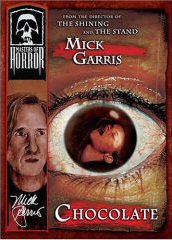
A cinematic shaman spinning literate, emotionally poignant dark miracles in the ghost-light of the silver screen, Mick Garris has earned his literary and cinematic success the hard way -- he worked for it! Garris worked as a scriptwriter on Amazing Stories and as a journalist over at Fangoria. While his earliest movie efforts included sequels to Critters, Psycho, and The Fly, he soon moved on to the Stephen King adaptations for which he primarily known. Writer/director of the supernatural coming-of-age drama Riding the Bullet, an emotionally penetrative and downright 'scary' fear fable, Garris is now most lauded for creating the Masters of Horror cable series. Adapting a screenplay from his short story Chocolate, he contributed one of that series more literary moments, focusing as much on subtle nuances of character as on sexual titillation and terror. Because the horror stemmed from characters we cared about, it was doubly effective. Anchor Bay presents the short film here with all its discs customary bells and whistles. After viewing this masterwork of suggestion and the mind at conflict with itself, you will never view chocolate, love, or relationships the same way again.
Originally seeing life as a short story in his collection A Life in the Cinema (see my review in Cemetery Dance magazine), published by Gauntlet Press, Chocolate is a dark, grieving valentine to the subconscious. A depressed, nowhere man living a nowhere life, sleepwalking between work and bed, wakes with the taste of chocolate in his mouth. The tasting of another person's memories -- a woman -- resonates with the inherent strange beauty and surreal dread of Joseph K./Kafka territory right from the beginning of the piece. Thinking that it was a freak occurrence, our Everyman tries to resume business as usual. When he begins experiencing visions and, worse, seeing through the eyes of a strange woman, disorientation turns to sheer panic. Yet a strange fascination also takes hold, and before Jamie realizes it, he travels to the next metaphysical stage, experiencing the woman's physical sensations, which include shower masturbation, fine dining, and, in a jarring sequence, rape. Forced for the sake of his sanity to find this mystery lady, Jamie finds more than he bargained for.
At surface value, Chocolate is the story about a man who sees through other people's consciousness from afar. At heart, it's an allegory of the entire human race, emphasizing our basic loneliness and inability to understand event those closest to us -- those we love, or wish to love. Hell, we can't even understand ourselves, and this is the dark territory of the heart that Garris mines which such poetic precision. When I asked Garris in a recent interview why he decided upon Chocolate, he mentioned that he wanted to "do something, as I did in Riding The Bullet, that made the internal (which is most often expressed in prose) external and cinematic." Chocolate achieves precisely this. Such universal fears as loneliness, alienation, and relationships take center stage, and the majority of the horrors are cerebral rather than graphic. Perhaps too sophisticated for an audience desiring nothing more profound than slap-dash action and violence, Chocolate explores the fear and attractions of sexuality often reserved for the adolescent. Confronting not only the differences between man and women but gaps in one's own identity, this movie is shocking on an emotional level that 'guts and crotch' simply can't compare with. Thinking man's horror, Chocolate is an elegant, effective nightmare precisely because it doesn't offer up its pleasures easily. This is easily one of the most poetic, mature episodes of the series.
Extras for this emotionally scathing effort are as numerous and generous as we've come to expect from Anchor Bay, including "The Sweet Taste of Fear," a comprehensive, personable interview with Garris, covering the basics of what he as done, why, and how (for more on the man behind 'Masters of Horror,' refer to my feature exclusive interview with him in Penny Blood magazine). "Working with a Master: Mick Garris" features the respective testimonials of many of Mick's friends and associates, themselves masters of genre. Like all of these "Working With" segments, the effect is rather like a genre "This is Your Life," and this is fine, because it offers a working knowledge/overview of Garris as a man and artist. Less intriguing are the interviews with thespians Henry Thomas and Lucie Laurier, which, despite being well informed, are rather routine. "The Making of Chocolate: Behind the Scenes" was disappointing, lacking focus or appeal, as it consists of nothing more than random footage of filmmaking. The most significant feature on the disc is the Garris commentary, where the soft spoken, friendly director speaks enthusiastically about the genre and filmmaking at length, his life, influences, and interests, revolving a majority of the talk around Chocolate in an easy, laid back manner. While the inclusion of a "Fantasy Film Festival Interview" with Roger Corman, conducted by Garris in his early days appears at first a bit off topic, it is enjoyable as yet another example of Garris at work, and therefore appreciated. The assorted Photo Gallery, Trailers, text Biography, and DVD Rom features round out this impressive DVD of a careful study of emotional terror.
Review by William P. Simmons
| Released by Anchor Bay USA |
| Region 1 - NTSC |
| Not Rated |
| Extras : |
| see main review |